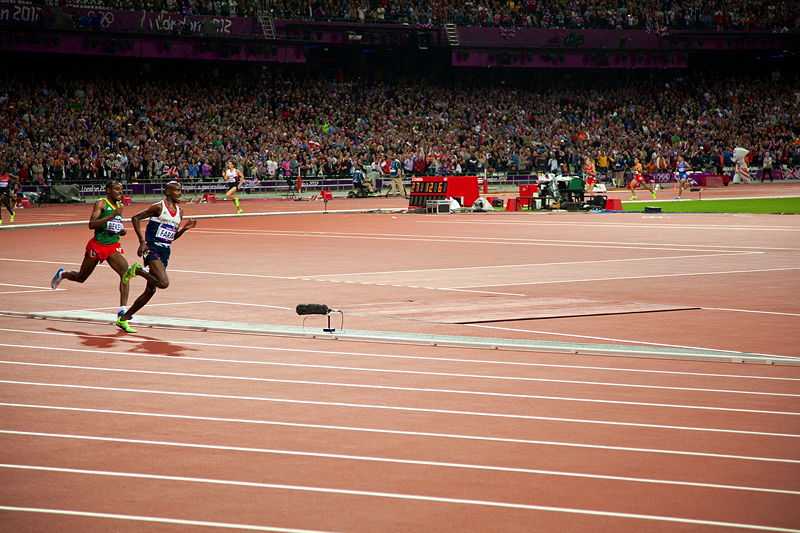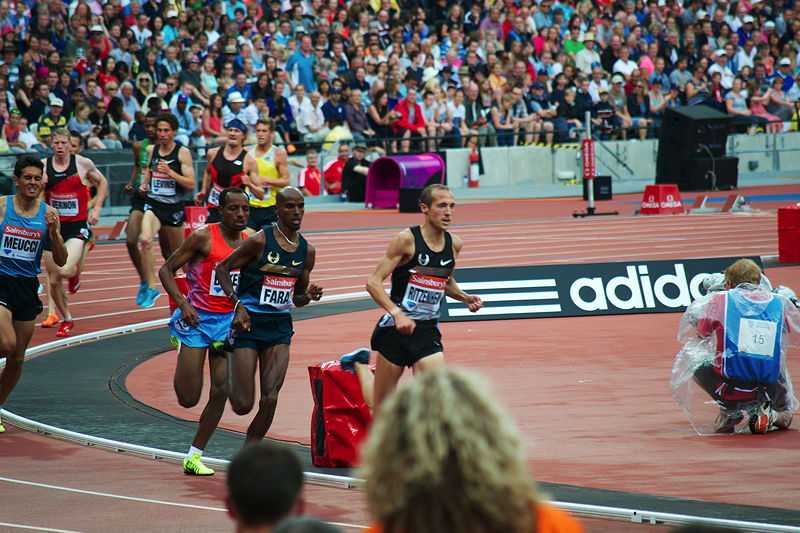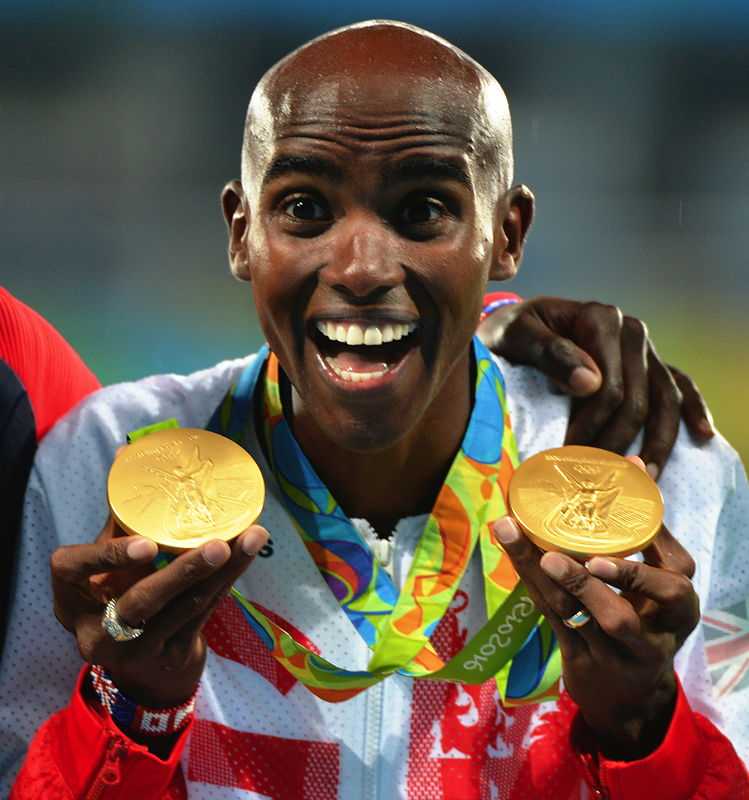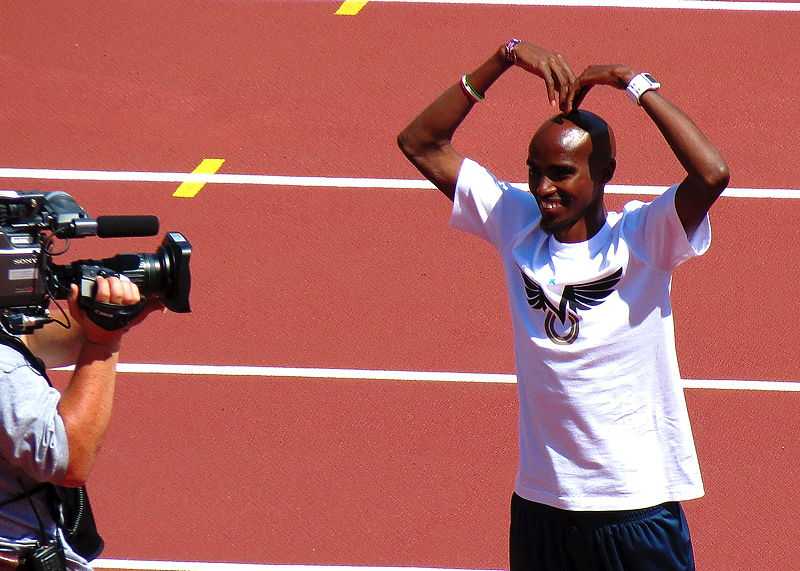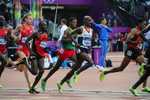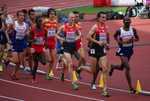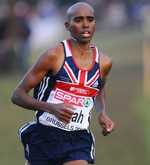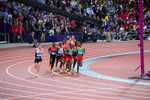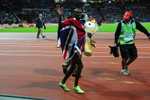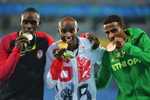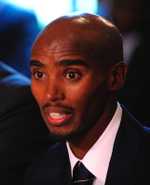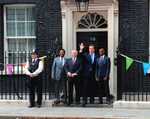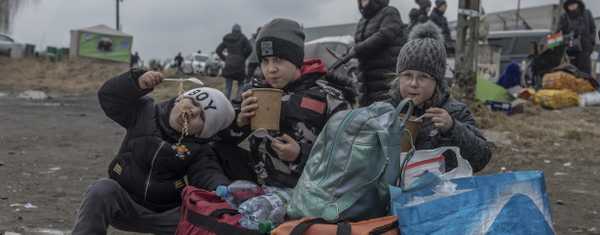1. Farah’s Early Life
At this time Somalia was in a state of political chaos and prone to increasing levels of violence, which led Farah to spend much of his early childhood in Djibouti.
However Mo Farah’s father was a British citizen who worked in London as an IT consultant and at the age of 8 years and with barely any English a young Mo Farah came to the UK with some of his family. During the upheaval one of his brothers, Hassan, had to be left behind through ill health.
Life in England would be difficult at first for the young boy from Somalia. With little English it was hard to fit in to his new surroundings and difficult to progress academically. The saving grace for Farah was his love of sports, especially football which he thought he could pursue.
Yet he was also a talented runner and while at Feltham Community College in London his running ability was spotted and encouraged by one of the teachers, Alan Watkinson. At the age of 14 Farah was picked to travel to a British Olympics futures camp in Florida, a trip which helped cement Farah’s choice of sport to pursue.
On his return Farah knuckled down to train harder and was rewarded by winning the English schools cross country championships.
2. Early Career
Mo Farah announced his arrival on the international scene in 2001, when at 15 years of age he won the European Junior championship 5000m under the coaching of Alan Storey.
After leaving Feltham Community College, Farah started to attend the endurance training centre at St Mary’s University in Twickenham. In 2005 he moved in to a house also occupied by Kenyan athletes competing on the European circuit, gaining a valuable insight in to what was required to be a world class athlete.
Farah’s experience here helped professionalise his approach to the sport and the results would soon start to follow.
In 2006 he became the second fastest British man over 5000m after Dave Moorcroft, before heading to the European Championships where he won silver at the same distance.
He rounded the year off by winning the European cross country championships in Italy. He was also gradually adapting to the world scene and at the 2007 World Championships in Osaka in Japan he was 6th in the 5000m, before going to the Beijing Olympics in 2008 where he was disappointed in missing out on qualifying for the final.
Mo Farah was now spending time training in Africa as he continued to progress. At the 2009 World Championships he was the best of the Europeans when placing 7th in the final of the 5000m, before winning the double at the European Championships in 2010 when taking gold in both the 5000m and 10,000m, only the fifth man to achieve the feat in the competition's history.
The following year saw him relocate to Portland, Oregon to work with coach Alberto Salazar before achieving his major breakthrough on the world stage at the World Championships that same year in South Korea, taking the silver in the 10,000m before claiming gold in the 5000m. Things were progressing nicely ahead of a home Olympics in London.
3. A Golden Era
Between 2012 and 2016 Mo Farah’s dominance established him as one of the greatest competition track distance runners of all time.
He went in to the London Olympics in 2012 with the added pressure of being one of Britain’s big medal hopefuls. Yet Farah did not disappoint, winning gold in both the 10,000m and 5000m events.
The 10,000m victory was part of an incredible night on the track for British athletes which saw the host country take 3 golds during what has become known as Super Saturday. The watching world was also introduced to the celebratory ‘Mobot’. The following year Farah repeated the double, returning from the World Championships in Moscow with two more golds for his burgeoning collection.
In 2013 Mo Farah demonstrated his core speed as a distance runner when breaking the European 1500m record in Monaco. In doing so he also claimed Steve Cram’s British record for the distance which had stood for 28 years.
Illness meant Farah had to sit out the 2014 Commonwealth Games but the following year he successfully defended his World Championship titles, winning gold again in both the 5000m and 10,000m races in Beijing. Farah was at the peak of his track career with another Olympics just around the corner.
Mo Farah prepared for the 2016 Rio Olympics by taking Dave Moorcroft’s long held 3000m British record. His form was not about to desert him in Brazil as he claimed the track distance double once again, the first man to win at both distances in two consecutive Olympics since Lasse Viren of Finland at the 1972 and 1976 games.
Yet Farah’s thirst for gold was not quite sated yet as he returned to the London track of his 2012 Olympic glory to take another gold in the World Championships over 10,000m. However this time the double was to prove elusive and Farah had to settle for silver in the 5000m.
4. Later Career and Legacy
Following the World Championships in London Mo Farah took the decision to focus on the Marathon.
He was already a successful runner on the roads and since 2014 has chalked up 6 consecutive victories over the half marathon distance at the Great North Run in Newcastle. His first attempt at the London Marathon was in 2014 when he finished 8th.
Since then he has broken the British record for the distance in London in 2018, a record previously held by Steve Jones for the past 33 years. Farah also won the Chicago Marathon the same year. He is currently coached by Gary Lough, having cut his ties with Alberto Salazar in 2017.
To achieve such a level of success has meant long spells away from his wife Tania and their four children, attending training camps and competitions. Those achievements were recognised with the award of a CBE in 2013, before receiving a knighthood in 2017 and becoming Sir Mo Farah.
2017 proved a good year for Farah on the awards front as he finally won what some may feel was a long overdue BBC Sports Personality of the Year award. He was also the European athlete of the year for 2011 and 2012.
Mo Farah has collected a host of national and European records on the track and on the road in his career, but also has the world indoor record over 2 miles which he achieved in Birmingham in 2015.
Away from the track Mo Farah set up his own foundation which looked to support orphans in Somalia, donating the £250,000 win from his victorious appearance on the TV game show ‘The Cube’ to this cause. He has been an ambassador for Save the Children since 2017 and in 2019 was announced as the patron of their Global Malnutrition Initiative.
A passionate Arsenal fan who still may wonder what would have happened if he had opted for football instead of athletics, he had the chance to show his football skills while playing in the charity SoccerAid event.
For most people Sir Mo Farah’s legacy will be his success on the track and in particular those golden years when he won back to back double golds at the World Championships and the Olympics.
His continued presence running on the roads in Britain will hopefully lead to more success and inspire more people to run and be healthier from it. What should not be overlooked is the determination and sheer hard graft which turned unquestionable talent in to full blown success.
From a young boy entering the country not knowing the language to a sporting icon recognised by even the least sporting households is a legacy in its own right.
